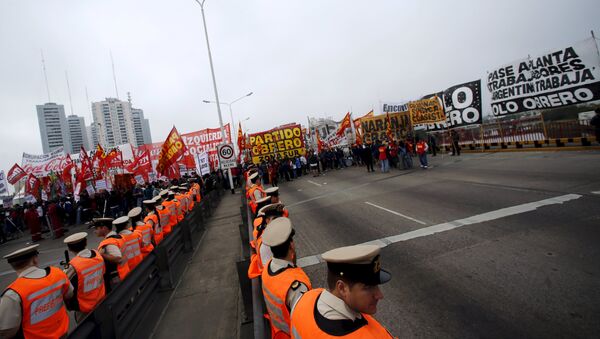MEXICO CITY (Sputnik) — The one-day national transportation strike hit Argentina with transport workers’ unions protesting against high income taxes, local press reported Tuesday.
Many of Buenos Aires' roads were blocked, flights cancelled, train and underground stations left deserted.
With inflation rate in Argentina reaching historic highs of more than 30 percent, transport workers’ unions went on national strike on Tuesday demanding a tax on their income to be revoked. The vast majority of them earn less than 5,500 pesos ($600) per month, not enough to cover basic needs, and some do not have employment contracts.
About 22 transport workers’ unions supported by the country’s major labor union, the General Confederation of Labor (CGT), organized the strike, which paralyzed the country’s public transportation.
#Argentina's transportation union kicks off 24-hour nationwide #strike to protest tax rates and inflation. pic.twitter.com/CX4jC5ASHI
— Benjamin Alvarez (@BenjAlvarez1) 31 Март 2015
“We get images of [the cities of] Cordoba, Mendoza, Rosario, the center of the city of Buenos Aires. It seems that the scope of the strike is very big. It looks like as if it were Sunday,” Pablo Micheli, the Central Workers’ Union leader said as quoted by El Mundo.
Some banks also remain closed and there was no rubbish collection throughout the day.
On Monday, the Argentinian government officials held emergency meeting, trying to convince transport workers' unions to cancel the strike.
“[Without the strike] 95 percent would be working, but they actually cannot because they do not have way to get to work,” Chief of the Cabinet of Ministers Anibal Fernandez told journalists on Monday.
RT @NewsRevo: #Argentina: National #strike and roadblocks today for #31M p/v @PTSPrensa pic.twitter.com/3D5G5L78zM
— NoJusticeNoPeace (@anubidal) 31 Март 2015
"#YoNoParo," or "I don't strike," quickly became a trending hashtag on Twitter on Tuesday.
This is the fourth national strike, which took place in Argentina since 2007. Analysts say the strike is expected to send a clear signal to Argentinian politicians ahead of the country's presidential election in October.


